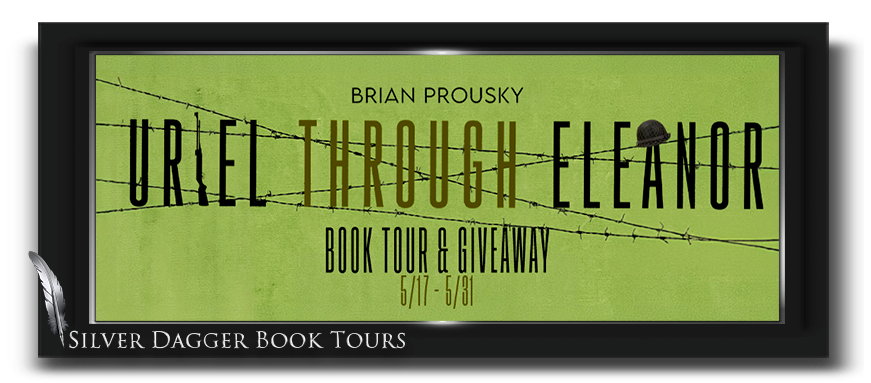Unlike any memoir you've ever read.
As absurd as it is devastating.
A literal tug of war between competing and compelling versions of the truth.
Uriel Through Eleanor
by Brian Prousky
Genre
Historical Fiction
Amazon * Apple * B&N * Google * Kobo * Books2Read * Bookbub * Goodreads
Brian Prousky spent most of his life as two distinct people. The first held a day job and raised a family and was public and sociable. The second ruminated over sentences and wrote books in secret and dreamed of a living a literary life. They shared little in common, mostly their obsessions: Bob Dylan, Joni Mitchell, Mozart, Saul Bellow, Roberto Bolano, tennis and hockey.
Somehow, summoning up a kind of courage or resolve he’d assumed was absent from his DNA, the first Brian Prousky left his day job, revealed his secret and dedicated himself full-time to writing. And the two Brian Prouskys became one. Now the author of five novels, a collection of short stories and two books of poetry, he lives and works in Toronto, where most of his characters, who struggle with secret and often conflicted lives of their own, and who never quite fit in, do as well.
Facebook * X * Instagram * NextChapterPub * Bookbub
#HistoricalFiction #HistoricalBooks #WorldWarII #Military #Biography #Memoir #books #readers #reading #booklovers #booktok #bookbuzz #bookboost #BookPromo #AuthorPromo #BookBlogger #Bookstagram #bookish #bookclub #MustRead #Writersofinstagram #AmReading #BookTour #Giveaway #writingcommunity #readerscommunity
We proceeded through the guards’ section of the camp and along a final, curved, narrow road, and emerged onto the wider main road that intersected countless prisoners’ barracks. It was like emerging into a different world. One that bore little resemblance to the world we’d occupied our whole lives. The smell that was hinted at since we’d entered the camp—a blend of vomit, shit, uncollected garbage, something indefinable and similar to our own unwashed bodies but different in its magnitude, like it had reached the point of decomposing or rotting, which, until then, we didn’t know was the coalesced, accreting emission from the living and dead alike—now enveloped us. It was inescapable and eye-stinging. And, still, not the primary assault on our senses. Which was everything we saw. And were unprepared to see. Despite the withered harbingers we’d already seen. And despite the fact that a good part of the population, perhaps an even more nightmarish part, was inside the barracks. Nonetheless, the vast, almost endless visible part, overwhelmed and overmatched us. There were thousands upon thousands—no, tens of thousands upon tens of thousands—of prisoners. An army of them. Like the strewn wounded of the losing side of a protracted battle. Milling or motionless. Filthy, half-clothed, shrunken, distended, stooped. Scarred and mangled by abuse. Frozen in expressions of anguish. Or unresponsiveness. Or vacated hope. Among them were the unburied dead. Arranged in piles. Every few hundred feet. But also unarranged and alone. Left where they collapsed and took their last breaths. The ground was like cake batter and they were as much a part of its consistency as the garbage. The living walked over them without a thought. Left shoeprints on them.
Within minutes of arriving at the main camp, I saw a male prisoner reach into his mouth and pull out a tooth and stare at it in his palm. I saw another male prisoner cough up blood, more onto his hand than a dirty, frayed rag he carried with him. I saw another male prisoner, who was pant-less and seated against the side of a barracks, swiping weakly and unsuccessfully at hundreds of darting flies that had strayed from the dead and had landed on, and drank from, open wounds on his legs. I saw male and female prisoners lean over and vomit. I saw male and female prisoners lying and writhing or twitching on the ground. I saw male and female prisoners with more bald spots than hair on their heads. I saw a female prisoner with a poorly bandaged hand that appeared to be missing all but one finger. I saw a female prisoner remove a thin sweater from a dead body and shake free a rat from one of the sleeves. I saw a female prisoner eating what looked like a cockroach. After which I tried, without success, to focus my gaze overtop all the prisoners.
A number of officers were shouting orders that may as well have been in a foreign language. None of us could hear what amounted to a lesser assault on our senses.
Three trucks, which had trailed behind us since we entered the camp, and which contained a grossly inadequate amount of food, water and medical supplies, passed in front of us, producing the briefest reprieve, and continued on toward a wooden building with a red cross painted on its roof, indicating, in a cruelly incompatible way, that it was the infirmary.
We began to attract prisoners, who approached slowly and cautiously. Perhaps disbelievingly. The first hundred or so stopped at the far edge of the road as if an invisible wall prevented them from coming nearer. Rows began filling in behind them. And soon more rows were filling in and extending back a considerable distance.
As much as the spectacle of their dehumanized existence had stopped us in our tracks, we too were a spectacle stopping them from coming nearer.
Men on either side of me were crossing themselves. Some wore the same expressions of anguish as the prisoners. Some fell to their knees. Some trembled. Some appeared suddenly lost. Though I imagine it was their minds shutting down to protect them from the deluge of impossible-to-process stimuli. Some, like Danny, cried quietly, using their bandanas to wipe their eyes.
I believe the only reason I wasn’t weeping or gripped by shock as well, was that I was arrested by a competing observation, or maybe an illusion, though, regardless, my mind was trying to make sense of why so many prisoners, the most wretched of the living and the whole of the dead, were drained of all but one colour. Their skin, hair, lips, eyes, visible wounds and blood were shades of grey. I wondered if their souls had vacated their bodies long before they died. And if it was an act of mercy. Leaving shed, ashen-turning husks that couldn’t experience further pain.
Follow the tour HERE for special content and a giveaway!
Print Copy of Uriel Through Eleanor – 3 winners!
$10 Amazon giftcard – 1 winner








No comments:
Post a Comment